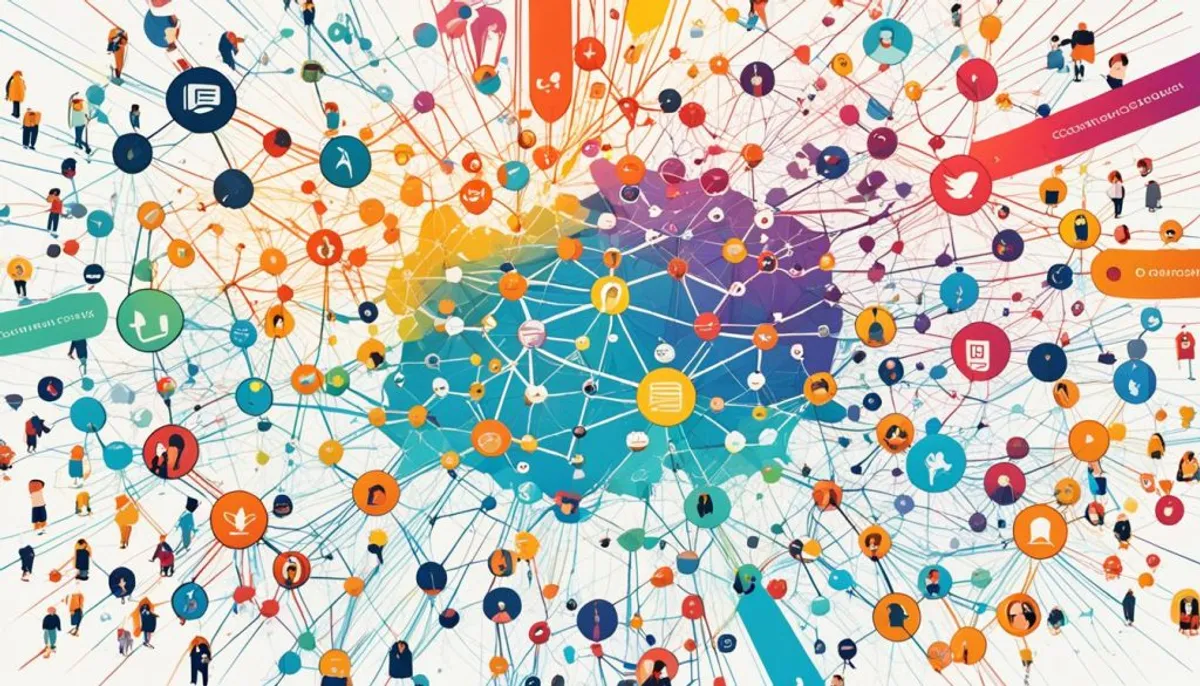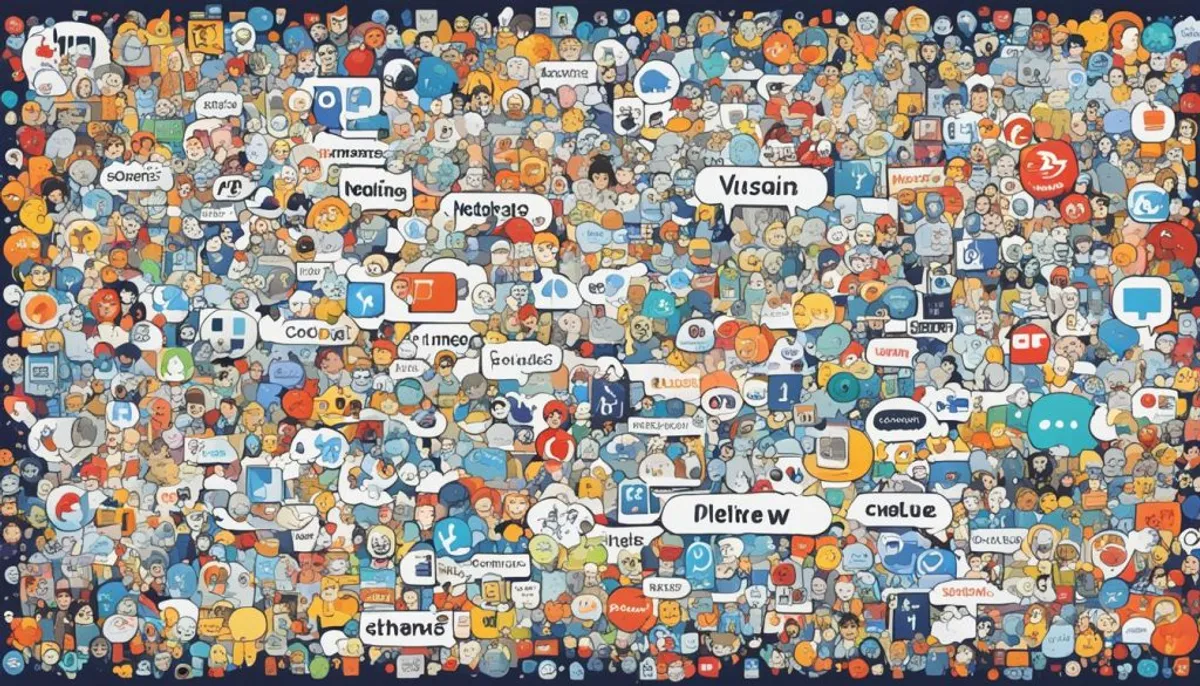Social networks have become key in our daily lives. They connect us with people around the world. They allow us to talk, share, and build relationships online.
In this article, we’re going to look at some popular social networks and their special features. We’ll cover big names like Facebook and Twitter, and newer ones like TikTok and Instagram. We’ll see what makes these sites stand out to billions of users globally.
If you’re interested in the top social media apps and platforms, stay with us. We’re about to explore the top apps and sites in the digital world.

Key Takeaways:
- Social networks allow users to connect, communicate, and share information online.
- Popular social networking sites include Facebook, Twitter, Instagram, and TikTok.
- There are more than 4.74 billion social network users worldwide.
- Social networks have become an essential part of our daily lives.
- We will explore various examples of social networks in this article.
What is Social Networking?
Social networking is about making connections and communicating online. It lets people keep in touch with those in their area, family, and friends. It also connects people with similar interests and helps identify behavior patterns among users. The first social networking site, SixDegrees.com, started in 1997. Now, many platforms help people share and connect worldwide.
Social networking builds bridges between people. It lets users create profiles, add friends, and talk through messages and posts. These sites are places to share life updates, pictures, and videos. They support different ways for people to express themselves.
Social networking is different from social media because it focuses on personal ties. While social media is for sharing with many, networking sites are for personal connections. They help people build networks based on common interests or goals. This is vital for creating a sense of community, but it is also important to consider the disadvantages of social networking.
With social networking sites and the rise of decentralized social networks, staying in touch with loved ones is easier. Users can find new passions or groups and join conversations. These platforms allow sharing ideas and getting support. Social networking enriches lives by changing how we interact and share with each other.
How Does Social Networking Work?
Social networking combines technology and internet connectivity. It lets users access sites on smartphones, tablets, and computers. Sites use languages like Python for data management.
Social sites focus on what users create. People make profiles, share info, and meet others with similar interests. They’re virtual spots for making friends worldwide.
These sites have special algorithms, too. They suggest friends and groups based on what you like and do. This makes finding new friends and groups easier.
“Social networking harnesses the power of technology and the internet to bring people together, enabling the exchange of ideas, information, and experiences.”
What users share is key on these sites. By posting their stuff, they make the platform lively. This includes posts, pictures, videos, and comments for interactions.
On these sites, you can share your life and learn from others. This sharing improves friendships and teamwork. With team engagement software, you can discuss, join groups, and view various opinions.
These sites are a mix of tech, sharing, and connecting, including the emerging concept of a decentralized social network. They change how we make friends, communicate, and build relationships online.

The Purpose of Social Networking
Social networking sites are very popular today. They let us share info, photos, and updates with friends and family. This sharing is one of their main goals.
These platforms are also great for learning. They keep us updated with the latest news and stuff about our community. They are a quick way to stay connected.
Another key role of social networking is to help us communicate. It breaks down time and distance barriers. We can chat and connect with people across the globe. This lets us talk, take part in discussions, and make new friends.
For companies, social networking is crucial for marketing. It helps them spread the word about their brand to more people. They can promote what they sell or offer, including various content types on facebook. It also helps in keeping customers coming back.
So, whether you’re using it for fun or for work, social networking is important in our online world. It helps us share, learn, connect, and promote our ideas or products.
Different Types of Social Networking
There are many social networking platforms, each with its own focus. Some connect you with friends, others with work. Let’s look at what makes each type unique.
Social Connections Platforms
Facebook and Instagram help you stay in touch with loved ones and favorite brands. You can post pictures, videos, and updates. It’s all about staying connected.
Professional Connections Platforms
Want to grow your career network? LinkedIn is perfect for that. It’s made for professional networking. You can meet colleagues, industry experts, and find new job opportunities.
Sharing of Multimedia Platforms
YouTube and Flickr are great for sharing videos and photos. You can upload your content or check out media from others. It’s all about creative expression and discovery, and with the rise of lemon8 photo-sharing, users have even more options to showcase their creativity.
News or Informational Platforms
For the latest news, Reddit and Digg have you covered. You can post news or join discussions on various subjects. It’s great for those who love information.
Communication-based Networks
WhatsApp and Snapchat focus on messaging and group chats. They make it easy to chat with friends or groups fast. Perfect for keeping in touch.
Educational Networks
Google Classroom and LinkedIn Learning offer learning online. They have courses and resources for students and pros, including opportunities to engage with educational networks. It’s about learning anytime, anywhere.
Now, you know the different social networking types. From making friends to learning new skills, there’s a platform for everything. Choose the one that fits your interests and goals best.

Advantages and Disadvantages of Social Networking
Social networking is a big part of our lives now. It brings both good and bad points. Let’s look at what makes social networking good and not so good:
Advantages of Social Networking
Many benefits come from social networking for both people and companies, including various types of social networking, such as the threads app and the most used social media app 2024. Additionally, implementing tailored strategies for businesses can enhance visibility and engagement on these platforms, especially when utilizing low-cost social media marketing services, livestream social media, and effective youtube seo strategies. Furthermore, the rise of decentralized social networks, including friendster, is changing the landscape of online interactions, including the threads app. Understanding the different types of social networking, including decentralized social network platforms, private community platforms, and partiful event planning while building personal connections to connect with friends is essential to maximizing these benefits, as well as improving visual memory in online interactions.
- Brand awareness: It lets businesses show their brand to the world. Sites like Facebook and Instagram are perfect for this.
- Instant reachability: You can quickly talk to friends, family, and customers worldwide. It breaks down distance barriers.
- Builds a following: Companies can create a loyal group of customers. They connect with people who might buy from them later.
- Business success: Social networks can help businesses grow. They boost customer activity, increase sales, and make customers happier.
- Increased website traffic: Posting links on social networks brings more people to a company’s website. This can lead to more sales and better search engine spots.
Disadvantages of Social Networking
However, social networking also has its downsides:
- Rumors and misinformation: False news can quickly spread. This can hurt people and companies and cause confusion.
- Negative reviews and comments: Bad feedback on social networks can damage a business’s image. It’s important to handle this feedback well.
- Data security and privacy concerns: These platforms collect a lot of user data. This raises issues about keeping information safe.
- Time-consuming process: Keeping up an online presence takes lots of effort. Making content, answering comments, and following trends require time.
Even with these issues, social networking is still valuable for connecting and growing. We need to use its benefits wisely while dealing with the problems, including understanding the behavior patterns of users.
Advantages and Disadvantages of Social Networking
| Advantages | Disadvantages |
|---|---|
| Increased brand awareness | Spread of rumors and misinformation |
| Instant reachability | Negative reviews and comments |
| Builds a following | Data security and privacy concerns |
| Business success | Time-consuming process |
| Increased website traffic |
Social Networks in Business
In our digital world, social networks are key for business success. They are great for learning about customers, engaging with them, and marketing. Using social networks helps businesses understand their audience, increase brand awareness, and make strong connections. Additionally, businesses in India can leverage various social media marketing platforms india to enhance their outreach and engagement strategies.
One big advantage is they let you research customers. By looking at what users do and like, companies can collect useful data. This helps them shape their products and messages to fit what customers want.
Social networks also let businesses talk directly to their customers. By joining social media conversations, they can build community and loyalty. This creates a space where customers can share feedback and get support.
“Social networks offer a direct connection between businesses and customers, allowing for targeted advertising and brand promotion.”
Marketing benefits greatly from social networks. They let businesses show ads to specific groups based on their interests and activities. This approach helps make marketing more effective and increases profits. Additionally, many companies are turning to low-cost social media marketing services to maximize their reach without breaking the bank.
These networks aren’t just for talking to customers outside the company. They can also improve how employees work together inside the company. They encourage sharing ideas and working as a team, which leads to more creativity and innovation.
Building brand awareness is crucial, and social networks are perfect for this. By posting interesting content regularly, businesses can get more attention. They reach more people and can become leaders in their field.
Listening to what people say on social media is also important. It helps businesses understand what customers think and want. This information is useful for creating products, marketing, and improving customer service.
To sum it up, social networks give businesses many ways to meet their audience and do research. They are powerful tools for marketing, creating loyalty, and driving success in the digital age.
Examples of Social Networking Sites
Social networking sites offer many choices. These platforms let people connect, share, and interact online. They help us connect with family and friends or grow professional connections.
Let’s look at some well-known social networking sites:
| Platform | Main Features |
|---|---|
| Connecting with friends, sharing updates, photos, and videos. | |
| MySpace | Customizable profiles, music sharing, blogging. |
| Microblogging, sharing short messages (tweets), following others. | |
| Professional networking, job searching, industry updates. | |
| Bebo | Connect with friends, share updates, and multimedia. |
| Friendster | Connecting with friends, sharing updates, photos, and videos. |
| Hi5 | Discovering new people, playing games, sharing media. |
| Habbo | Creating avatars, virtual rooms, social gaming. |
| NING | Creatingsocial networks, connecting individuals with similar interests. |
| Classmates | Reconnecting with old schoolmates, sharing memories. |
| Tagged | Discovering new people, playing games, and joining groups. |
| myYearbook | Connecting with friends, playing games, sharing media. |
| Meetup | Joining groups, attending events, meeting people with similar interests. |
| MyLife | Connecting with friends and family, sharing updates. |
| Flixster | Movie ratings, reviews, and sharing entertainment updates. |
| myHeritage | Building family trees, sharing genealogical information. |
| Multiply | Sharing media, blogging, connecting with friends. |
These examples show the range of social networking sites available. Whether to stay in touch with loved ones, grow professional networks, or share passions, there’s a site for everyone.
Types of Social Media Platforms
Social media platforms are diverse, each serving a unique purpose with its features. Knowing the differences helps businesses connect with their audience. It lets them share engaging content and strengthen their brand identity.
Traditional Social Networking Sites
Facebook and LinkedIn are classic social networks. They help connect people with friends, colleagues, and professional contacts. Here, users can post updates, share photos, and talk with their network.
Image-Based Social Media
Platforms like Instagram and Pinterest focus on images. Users share photos and art, discover new inspiration, and follow interesting accounts.
Short-Form Video Social Media
TikTok and Vine are about short videos. They’re places for viral challenges, stories, and fun content that grabs your attention quickly.
Livestream Social Media
Twitch and Periscope let users stream live videos to followers. It’s a hit with gamers, influencers, and businesses who want live interactions.
Discussion Forums
Reddit and Quora are for discussion and knowledge. People can ask questions, give answers, and join conversations on various topics.
Private Community Platforms
Slack and Discord are for private groups to chat, work together, and share info. They’re great for keeping teams and communities connected.
Decentralized Social Networks
Mastodon and Diaspora value privacy and data control. They use decentralized tech to let users manage their data and connect freely.
Knowing the various social media platforms gives businesses an edge. It helps them pick the right platforms for their audience. By using social media wisely, companies can grow, build stronger relationships, and meet their marketing goals.
| Type of Social Media Platform | Key Features |
|---|---|
| Traditional Social Networking Sites | Profile creation, connection with friends and professionals, content sharing |
| Image-Based Social Media | Photo and artwork sharing, visual inspiration, interest-based following |
| Short-Form Video Social Media | Bite-sized video creation and sharing, viral challenges |
| Livestream Social Media | Real-time video broadcasting, live audience interaction |
| Discussion Forums | Engaging in conversations, knowledge sharing, seeking advice |
| Private Community Platforms | Dedicated spaces for specific groups, internal communication, collaboration |
| Decentralized Social Networks | User privacy, data ownership, decentralized protocols |
Conclusion
Businesses have many social media networks to consider for their strategy. They can choose from Facebook, Twitter, LinkedIn, and Instagram. Each can help connect with the right audience. It’s vital for businesses to weigh their goals, audience, and content approach wisely.
Choosing the correct platform helps businesses engage better with people. This can lead to more brand awareness, customer interaction, and website visits. Knowing about various social media and their features is key to a smart social strategy.
For a strong social media plan, creating good content is crucial. Content should appeal to the target audience. Using each platform’s special tools can boost visibility and success. Understanding each platform well can make a social media strategy more effective in reaching people and getting results.
FAQ
What are social networks?
Social networks are online spaces where people and groups can connect and share. You can form new friendships or catch up with old ones, often through experiences made with friends connections.
What are some examples of popular social networking sites?
Popular sites include Facebook, Yelp, Twitter, Instagram, and TikTok. Each one lets you connect in different ways.
How many social network users are there worldwide?
Over 4.74 billion people across the globe use social networks as of January 2022. That’s a lot of connecting!
What is the difference between social networking and social media?
Social networking is about making connections. Social media focuses on sharing with many people. Each serves a different purpose.
How do social networking sites work?
Sites function through technology. They allow access via devices and manage data with programming languages like Python.
What are the purposes of social networking?
Its goals are sharing news, learning, interacting more, and marketing. Social networks broaden our world in many ways.
What are the different types of social networking platforms?
Types include networks for friends, work, sharing photos or news, chatting, and learning. There’s something for everyone.
What are the advantages and disadvantages of social networking?
Advantages are brand boosting, quick updates, growing followers, and business growth. Utilizing instagram business tools can enhance these benefits. But, it can spread false info, harm reputations, raise privacy issues, and eat up time.
How can businesses use social networks?
Businesses can research customers, engage with them, market, and boost team collaboration. They’re tools for growth and listening.
What are some examples of social networking sites?
Sites include Facebook, MySpace, Twitter, LinkedIn, and many others. They offer varied ways to connect online.
What are the different types of social media platforms?
Types include traditional networks, photo platforms, short videos, livestreaming, forums, private groups, and decentralized networks. Each serves a unique function.
RelatedRelated articles



